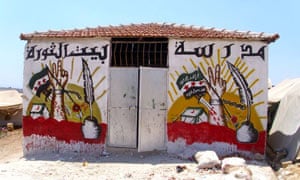
Robin Yassin-Kassab:
'The media image of the liberated areas suggests the regime has been replaced by heavy-handed militias. At least in Idlib province (Aleppo has suffered much more from thuggery, corruption and Islamist fanaticism, a fact much lamented by the activists and fighters I spoke to), it is not like that at all. No checkpoint stopped us. The men with guns were locals and were considered protectors, not oppressors.
Many men have fought. They fight for a while, then take time off to visit their families in the camps or to harvest the fields (those that haven't been burned). Most have no political aim other than defending themselves by ending the regime. Some are Islamists, usually moderate and democratic. One such is Abu Abdullah who, before his leg injury, fought with the rebel group Liwa al-Islam in Douma in the Damascus suburbs. He shocked me with his statement: "We aren't fighting for freedom, but for Islam." But the follow-up was more reassuring. "Europe," he said, "is implementing Islam without being aware of it. It educates its people, it respects their rights, there's one law for all."
This is an Islamist who shakes hands with unveiled women and opines that Christians often have more self-respect than Muslims. He doesn't fight for "freedom" because to him the word means people doing anything they like, regardless of the rights of others. His vision of an Islamic state is one compatible with democracy; it wouldn't enforce dress codes or ideological allegiances because (he quotes the Qur'an) "there is no compulsion in religion".
As for the foreign fighters, Abu Abdullah, like everybody I spoke to, views them with disdain. Syria has enough men, he told me. Syria needs weapons, not men. Foreigners only cause problems. They increase the sectarian element, as Assad and Iran want. They ruin the revolution's reputation. In any case, most of them aren't fighting but resting, waiting for "the next stage".'
No comments:
Post a Comment